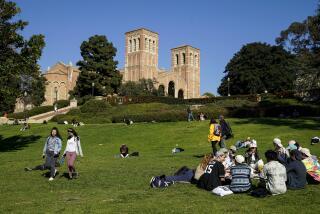Presidential debate runs into Indian casino labor fight
Labor’s fight to organize Indian casino workers in California spilled into the presidential campaign Wednesday when a Native American leader accused a union of trying to derail a Democratic forum envisioned for the Morongo Indian Reservation this summer.
The event’s organizer said the union had pressured candidates to skip the debate because the tribe-owned casinos were strongly opposed to unionization. A union officer denied the accusation.
Only two presidential candidates -- New Mexico Gov. Bill Richardson and former Alaska Sen. Mike Gravel -- have agreed to take part in the “Prez on the Rez” event planned for Aug. 23 at the Morongo casino-resort near Banning.
Kalyn Free of the Indigenous Democratic Network, which is sponsoring the debate, said candidates’ failure to attend could determine who Native Americans supported and how much the deep-pocket tribes spent in the campaign.
“Tribal leaders are going to remember who came to ‘Prez on the Rez’ and, more importantly, who didn’t,” Free said.
In proposing a forum at Morongo, Free stepped into the middle of a years-long fight over efforts to organize casino workers. It comes as Morongo and four other Southern California tribes seek legislative approval to more than double the size of their casinos, an effort stalled in part because of labor opposition.
Free said the top candidates had not responded because of pressure by a union, Unite Here, which is trying to organize casino workers at Morongo and elsewhere. The union denies seeking a boycott.
“I’m aware,” said Jack Gribbon, the union’s California political director, “that there may be a Democratic presidential candidate or two who is concerned about the ongoing struggle in California over enforceable workers rights. However, to say that Unite Here has specifically asked that candidates not attend is not true.”
The union is particularly influential in Nevada, where its Culinary Local 226 represents 60,000 casino workers. An endorsement by the union could be crucial for a Democrat seeking to win the Jan. 19 Nevada caucus.
Free, a member of the Choctaw Nation of Oklahoma and a former Justice Department lawyer, is a member of the Democratic National Committee. She has been organizing the forum for a year, with help from the DNC.
“The DNC and [Chairman] Howard Dean have been very supportive,” said Luis Miranda, a spokesman for the Democratic National Committee. But “it’s up to each of the candidates’ schedules whether they can make it.”
If the Democrats cannot fit the event into their schedules, Free said, she would invite top Republican candidates -- “and they’re going to have unfettered access to tribal votes and tribal money.”
Free’s organization has an independent campaign committee that raised $410,653 for the 2006 campaign, including $35,000 from Morongo, its largest donor.
Though there are caps for individual donors, federal law does not impose aggregate caps on the amounts that tribes can donate to federal campaigns. Free said they could “give us millions and millions” to spend on the 2008 campaign.
Indian tribes have not been deeply involved in presidential politics, but they have donated heavily to national party organizations and congressional candidates.
Five California tribes with large casinos -- Morongo, the Agua Caliente band in Palm Springs, the San Manuel tribe near San Bernardino, the Pechanga band near Temecula and the Viejas tribe east of San Diego -- spent $4.6 million on federal campaigns last year.
*
Times staff writer Nancy Vogel contributed to this report.
More to Read
Get the L.A. Times Politics newsletter
Deeply reported insights into legislation, politics and policy from Sacramento, Washington and beyond. In your inbox three times per week.
You may occasionally receive promotional content from the Los Angeles Times.






